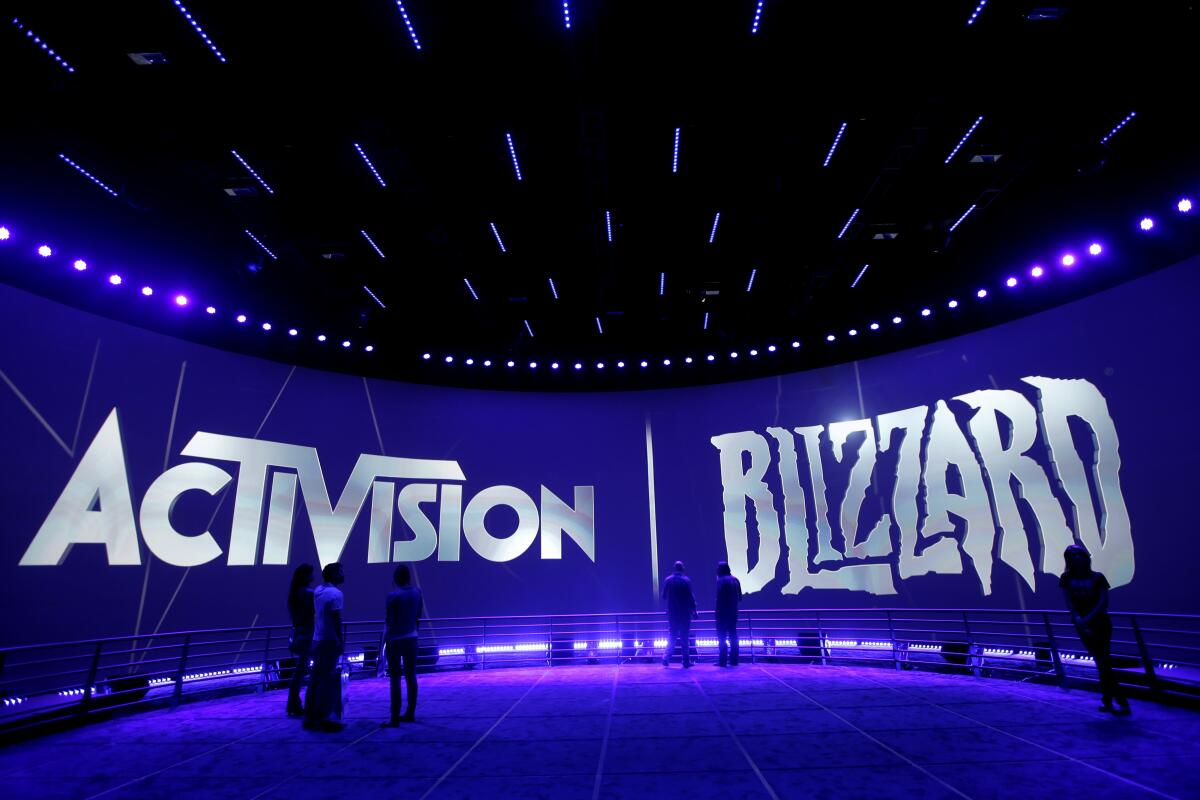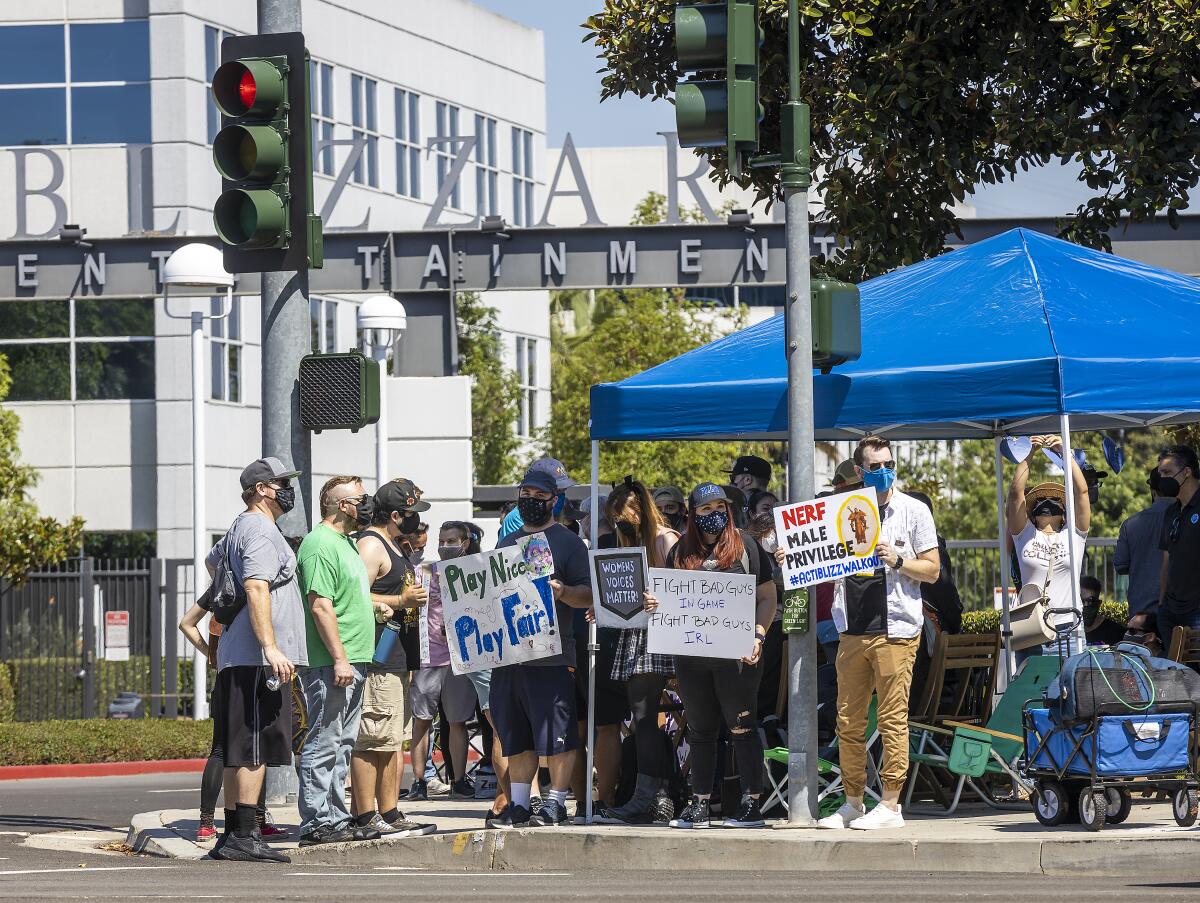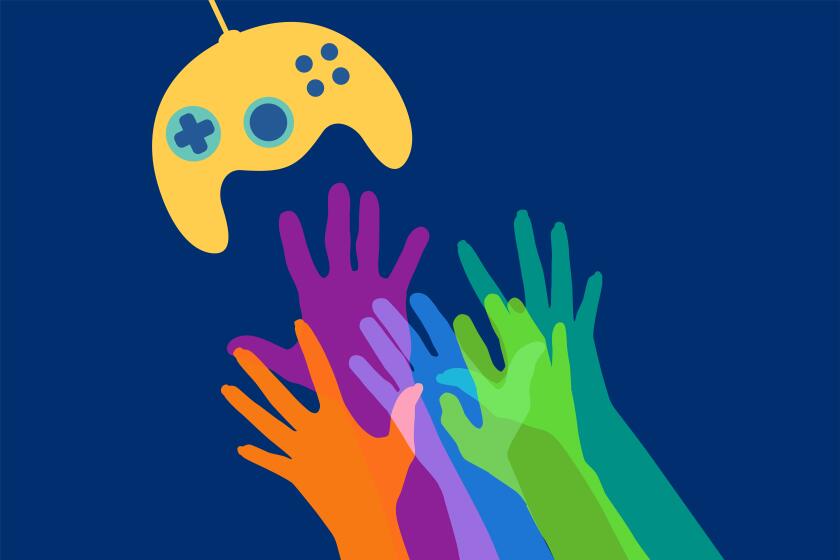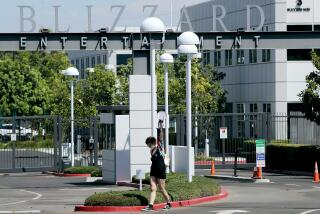Activision Blizzard will be forever stained if current leadership stays in place

- Share via
If only Activision’s board of directors could handle all of our performance reviews.
Imagine such a world, where forward-looking statements and stern pledges could virtually erase a lawsuit and revelations from multiple news outlets, including this paper, Bloomberg, the Washington Post and most recently a Wall Street Journal investigation that showed Activision Blizzard’s chief executive led the management of a toxic workplace culture rife with sexual harassment and inequities. Going forward, we should all request the repercussions-free Bobby Kotick treatment when meeting with our supervisors.
Judge us not for the environment that we have built and that has surrounded us for multiple decades, but instead for tough-sounding zero-tolerance guarantees we make for the future.
If only such a policy were offered to non-CEOs — you know, the folks not accused in a newspaper report of allegedly leaving a death threat to an assistant in a voicemail. But, hey, what is staff if not a depository for hopefully empty threats? Activision Blizzard is, apparently, a special place, a Southern California company home to increasingly middling but perennial hit “Call of Duty” games and the fantasy standby that is “World of Warcraft.”

)
Not just anyone can run a company estimated to be worth more than $50 billion. So while many in the game industry gasped in the wake of new revelations of Kotick’s failure to deal with what occurred behind closed doors — Sony Interactive Entertainment CEO and President Jim Ryan was quick to express “deep concern” while Microsoft’s Xbox chief Phil Spencer said he is “evaluating all aspects of our relationship with Activision Blizzard” — the board of directors at Activision dismissed the reports and released a statement pledging allegiance to Kotick’s ability to implement “industry leading changes.”
If only.
This is not an isolated incident or two, a single regrettable lapse in judgment. Kotick, CEO since 1991, has had two decades to mold the game company he wanted, to lead a path out of gaming’s crude early stereotypes. He built a behemoth, but one that is now the target of multiple lawsuits and a Securities and Exchange Commission investigation. The perception today is the company places the goals of its executives and shareholders ahead of the needs of its staff and the players, turning a blind eye to calls for improvement and even viewing them as a nuisance.
The suit filed against Santa Monica-based Activision Blizzard lays bare the gross inequalities that have long plagued a male-dominated industry
This is a studio that in July the California Department of Fair Employment and Housing (DFEH) singled out for boorish, boyish stereotypes in a 29-page lawsuit that argued that the executives of Activision Blizzard grew a “pervasive frat boy workplace culture” and allegedly perpetrated or ignored inequality and sexual harassment. The lawsuit was the result of a lengthy investigation that documented how harassment was practically encouraged, fueled often by alcohol and written off as a joke in a workplace that’s about 80% male.
Many outside the company were slow to take the problems at Activision seriously in part because they didn’t take video games seriously. But it’s a company as vital to the Los Angeles entertainment community as Disney, Netflix, Sony and any of the Hollywood players who get far more mainstream media scrutiny.
This week‘s damning Wall Street Journal investigation was a wake-up call, with reports that the company’s top leader was aware of numerous egregious accusations, including the protection of an executive whom human resources recommended be fired. Since the July DFEH filing, according to the Journal, more than 500 current and former Activision employees have come forward with claims of “harassment, sexual assault, bullying, pay disparities and other issues.”
Allegations of sexual, emotional and professional abuse reveal the game industry’s struggles to mature. Ubisoft resignations are only part of the fallout.
This week, the latest revelations led to a company walkout that demanded Kotick step down.
“Under Bobby Kotick’s leadership the company has been accused of mistreatment, sexual harassment, rape, and a death threat made by Kotick himself. The board is just as complicit if they let this slide,” read a statement released by a group of staffers helping to organize the walkout.
While no one expects a CEO to know every issue that happens throughout a company, these are 500 additional instances that happened under Kotick’s watch. Such a number lends credence to the DFEH suit, which described an environment where male employees “engage in banter about their sexual encounters, talk openly about female bodies and joke about rape” among its approximately 9,500 employees, who make games for more than 100 million worldwide players.
Which is worse — that Kotick was unaware of such a culture or that he spent two decades not caring about what was happening in his name?
The company has slammed the WSJ report as presenting “a misleading view of Activision Blizzard and our CEO.”
In a statement, Activision Blizzard writes that “instances of sexual misconduct that were brought to his attention were acted upon. The WSJ ignores important changes underway to make this the industry’s most welcoming and inclusive workplace and it fails to account for the efforts of thousands of employees who work hard every day to live up to their — and our — values.”
The Journal indeed notes that there were instances of sexual harassment reported to the executives and human resources that were acted upon. But it also paints a distressing picture of a company that can’t shake its reputation as a boys’ club. The Journal writes that a co-head of one of Activision’s “Call of Duty” studios was “accused by a female employee of sexually harassing her in 2017 after a night of drinking.” After an investigation, it was recommended he be fired, but according to the Journal, “Kotick intervened to keep him.”
Perhaps, as part of this new “zero tolerance” policy, the results of internal investigations of sexual harassment will be heeded.
Yet just this summer, Jennifer Oneal was appointed to co-lead Blizzard, only to announce her resignation three months later.
Citing internal emails, the WSJ reported Oneal was paid less than her male counterpart, had endured her own stories of harassment and “professed a lack of faith in Activision’s leadership to turn the culture around.”
This DFEH suit has succeeded in making it impossible to overlook the inequities the game industry has long perpetuated. It’s hard to imagine a future for Activision Blizzard with Kotick at the helm in which every release, every game, every studio doesn’t come with an asterisk, a note that for two decades this company turned the other way when it came to pay disparities and the safety of its staff.
Activision’s board and its executives could opt to hide behind the blind loyalty many a player feels for “Call of Duty” or “World of Warcraft,” but that sounds awfully cynical even for the game industry. Wait. Never mind. It sounds like just about what we’ve come to expect.
More to Read
The biggest entertainment stories
Get our big stories about Hollywood, film, television, music, arts, culture and more right in your inbox as soon as they publish.
You may occasionally receive promotional content from the Los Angeles Times.













